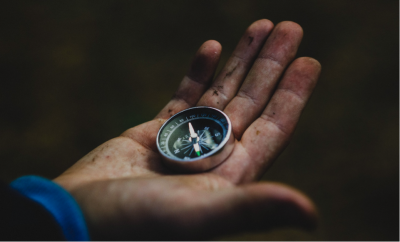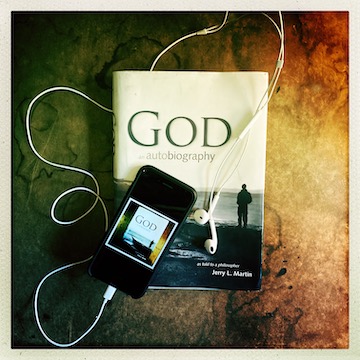Telling God’s Story, One Entry at a Time
Reflections from Jerry’s Daybook and Episode 236 of God: An Autobiography, The Podcast

“I want you to tell My story.”
When Jerry L. Martin first heard God speak, he didn’t believe in God. He was a philosopher, a lifelong agnostic. And yet, the voice that came to him was unmistakable.
As Jerry describes in Episode 236 of God: An Autobiography, The Podcast, God asks for something more intimate than a retelling of ancient scripture. He asks for a life lived in dialogue with the divine.
That calling continues today, not just in Jerry’s books and podcast recordings, but in the quiet insights he captures in his Daybook.
In the entry below, Jerry recounts a dream that unexpectedly opens into spiritual insight. It’s a dream about timing, meaning, and what it might mean to live each day paying attention to God.

Daybook Entry: “Today Is Tomorrow”
I had the following dream. Some people were hosting a group to discuss the God book with me. As we drove to their house, we noticed some neighbors who were coming to join the meeting. To my surprise (actually, shock), when Abigail and I arrived, there was a whole crowd there, lined up in rows on lawn chairs in the front yard. They were facing a porch to be used as a speaking platform.
I had not planned to give a speech, and had nothing prepared, but I said to Abigail, “I think I had better get up there and give a talk.”
“Well, YE-AH!” she replied.
So I got up on the porch and looked at the crowd. I said, “SOMEBODY has done a great job of getting this crowd together,” and I saw a guy toward the back beam at the compliment. Chatting for a moment with someone in the front row, I said apropos of I know not what, “Today is tomorrow.” And then I said, “That wouldn’t be a bad name for a speech.” So I said to the crowd, “I did not have a speech prepared but talking with this person up front, I realized that ‘Today is tomorrow.’”
I am not usually glib but this time I launched on an elaborated discussion of the ways in which today prepares for tomorrow—enacts it in advance, you might say—and what happens tomorrow is that today’s preparation plays out. And today is, in fact, every tomorrow, and so on in that vein.
“This isn’t bad,” I thought, “though it is a lot like a Hallmark card version of a lifemanship presentation.” Then the scene faded.
Superficial or not, I was probably onto something. I have long felt that I should live every day as if the sum of my life as a whole depended on what I do now and here. My thought is not so much that what you do today sets the terms of what you are able to do tomorrow, though that is true. But my thought is more about the meaning of life, as if the highest ideal I am able to live right now casts a meaning over the whole of my life. Whether that is wisdom or just a facsimile of it, I can’t know. I occupy the thought, and can’t see over its rim. Maybe you can.

Listen to the Episode That Inspired This Post
In Episode 236, Jerry shares the moment God asked him to “tell My story,” and how we each have a part to play in that story, if we’re willing to listen.
🎧 Listen now or start from Episode 1 to hear the full journey.












